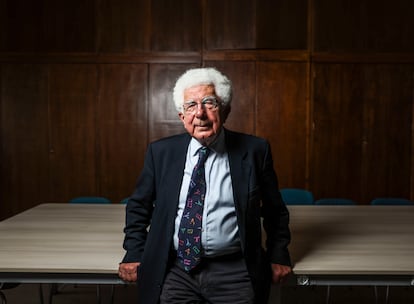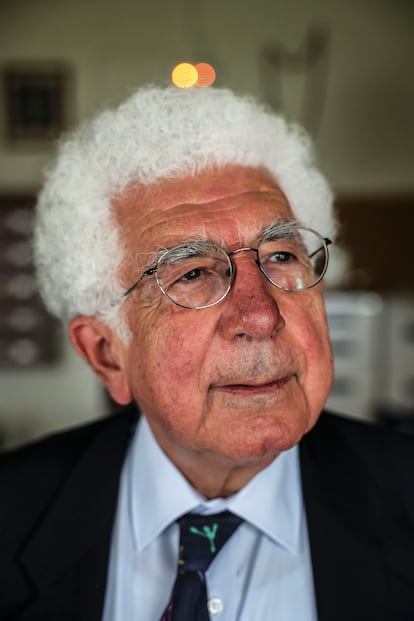Israeli-British historian Avi Shlaim: ‘Western powers will be complicit in Israel’s attack on Gaza’
The author of some of the best works on how to understand the region claims that Israel’s current military campaign against the Gaza Strip is ‘state-sponsored terrorism’

The strength of the words of Avi Shlaim — a 77-year-old historian with dual nationality, Israeli and British — is not in the volume of his voice or the speed with which he speaks. Shlaim speaks slowly and in a soft voice. He is measured and carefully chooses his words as he gesticulates to emphasize his point. But his message has fallen on deaf ears as the region where he grew up experiences one of its most violent moments.
Shlaim was born in Baghdad, Iraq to a wealthy Jewish family. That’s why he feels like a Jewish Arab. In the early 1950s, the Shlaim family immigrated to Israel. As a teenager, young Avi went to study in the United Kingdom. He later had to return to Israel to complete his military service. Shlaim now resides in Oxford, where he was professor until just two years ago. He is known for writing some of the best works on understanding the Middle East, among them, The Iron Wall: Israel and the Arab World, and his latest work, Three Worlds: Memoirs of an Arab Jew.
Shlaim, an unabashed critic of the Israeli government, spoke with this newspaper last Thursday following a congress titled The future of the Palestinian question. 75 years after the Nakba. He’s critical, especially when it comes to Zionism. Talking about the issue, he remembers the following: “My mother used to talk about the wonderful Muslim friends we had in Baghdad and one day I asked her if we had Zionist friends. And she said: ‘No, Zionism is an Ashkenazis thing, for European Jews.’”
Question. You grew up and lived in Israel and have Israeli nationality. What are your thoughts about this escalation of violence?
Answer. These are very dark times. And on October 7, Hamas launched an attack on Israel. And it was a game changer because it was the first time that Hamas invaded Israeli territory and attacked Israelis inside Israel itself. But the conflict did not start on October 7. The conflict started a century ago. And in 2005, Israel withdrew unilaterally from Gaza. But it was a unilateral disengagement. It wasn’t part of an agreement with the Palestinian Authority. And it wasn’t a step towards a comprehensive settlement of the Israeli-Palestinian conflict.
Israelis claim that they gave the Palestinians a chance to turn Gaza into the Singapore of the Middle East. But they did nothing of the sort. They turned Gaza into an open air prison. The media attention has been on the Hamas attack and on Israel’s response, which is out of all proportion. I condemn both. I condemn the Hamas attack because it was against civilians. And killing civilians is wrong, period. But the Israeli response has been brutal and savage and out of all proportion. And revenge is not a policy. And what Israel is doing is state-sponsored terrorism. Or state terrorism. It’s on a much more serious scale than the attack on Israel.
The point I really want to emphasize is that the conflict didn’t start on October 7. People don’t ask why did Hamas launch this attack. And the answer is to be found in the context. And the context is the Israeli occupation of the Palestinian territories since 1967.
Q. Why is it so difficult to talk about the context of the Israeli occupation now?
A. Israelis don’t look at the past. They only look at what happened to them. And this was real trauma. And Black Saturday was the worst day in Israel’s history. They are traumatized. Whereas before the attack, there was a very serious protest movement against Netanyahu and his plan of judicial reform. Now everyone in Israel is united behind pursuing this war against Hamas. But when the hostilities are over, the anger will be turned against Netanyahu.
I speculate that he would not be able to survive politically. But then there is the Western response to this crisis. And the hallmark of the Western response is hypocrisy and double standards. And one example of Western hypocrisy was when Hamas won a fair and free election in January 2006. But Israel refused to recognize the Hamas government. The European Union and the United States backed Israel with economic warfare to undermine Hamas and force Hamas to violently capture power in Gaza. After this happened in 2007, Israel imposed a blockade on Gaza. The blockade is illegal, unlawful, because it’s a form of collective punishment against civilians. But now Israel is taking it a stage further than a blockade. It’s a medieval kind of siege where they said they would stop water, food, medicine, fuel from going to the 2.3 million people of Gaza.
Western powers are still completely one-sided. They denounced Hamas and its barbarity and they call it a terrorist organization. But they don’t look at the Israeli response and they don’t criticize Israel. So they’ll be complicit in the Israeli attack on Gaza and in the attack on civilians. Basically they give Israel a free pass to do its worst in Gaza instead of calling for a ceasefire.
Q. You are a historian, what part of history will the current conflict between Hamas and Israel occupy?
A. The roots of the conflict go back at least to 1948 in the Nakba [the Arabic word for the “catastrophe” that Palestinians use to refer to the declaration of the state of Israel and their expulsion from their lands]. And today the Nakba is not a one-off event that happened in 1948 when three-quarters of a million Palestinians were expelled and the name Palestine was wiped off the map. It’s an ongoing process rather than one-off. Since 1967, Israel has been building settlements and expanding settlements. Israel annexed East Jerusalem and has been carrying out ethnic cleansing there. Today we might be on the verge of a second Nakba, of a second major catastrophe with the mass expulsion of Palestinians.
Israel withdrew from Gaza in 2005. But Israeli generals have a phrase, mowing the lawn, cutting the grass, which means they have no solution, only brute military force. Every few years they go in with heavy arms and high technology. They kill thousands of people. They destroy tens of thousands of houses. They damage the infrastructure. They degrade the military capability of Hamas and then they withdraw. This is not a solution. By my count, this is the sixth major Israeli assault on the people of Gaza. And so far it’s the most serious with the most far-reaching consequences. It’s the most destructive because Israel has been attacking ambulances, hospitals, mosques, schools, UNRWA schools where civilians are taking refuge, UNRWA depots. And it’s accompanied by an Israeli order to 1.1 million residents of Gaza to move from the north to the south. This is mass transfer, forced transfer of civilians.

Q. You describe yourself as Arab and Jewish. What response would you get if you traveled to the region today and defended that identity?
A. I lived in Baghdad up to the age of five. And I’m an Arab Jew because I lived in an Arab country. And there is no better way to describe my first identity as that of an Arab Jew. That’s the experience of my family and me and the Jewish community in Iraq. We’re one minority among many. We were not the other as in Europe. Iraq didn’t have a Jewish problem. This identity existed in the past, and I am a living example today of an Arab Jew. And I’m proud of both parts of my identity. I’m proud of the Arab heritage and I’m proud of the Jewish heritage. I make no apologies for that.
Is the concept of an Arab Jew still relevant today? The answer is no, not really, because in 1950 when we left Iraq, there were 135,000 Jews in Iraq. Today, there are three Jews left in Iraq. But it’s relevant because for me, Muslim-Jewish coexistence isn’t an abstract concept. It’s not an ideal. It was an everyday reality. We lived it, we experienced it, we touched it, and therefore recalling the experience of the Jewish community in Iraq and my family enables me to think of a better future for our region. To counter the Zionist claim that Muslim Jewish Arab-Israeli hostility is preordained and that the two sides are doomed to live in perpetual conflict. The concept of an Arab Jew is still relevant because it enables me to think of what I would like to be the outcome, which is one democratic state from the Jordan River to the Mediterranean Sea with equal rights for all its citizens regardless of religion and ethnicity.
Q. The coexistence between Arabs and Israelis in the Middle East was real. What changed everything?
A. The element that changed its coexistence is nationalism. Nationalism is the root of the problem. Harvard professor Samuel Huntingdon, after the end of the Cold War, came up with a thesis of clash of civilizations. He said that international conflict is no longer between states, it’s between civilizations. Judeo-Christian civilization on one hand and Muslim civilization on the other. And Islam completely rejects Jews and the West. I think this is a very silly and superficial notion. This conflict is about real things. It’s about two people in one land. That’s what the conflict is about. And the driver of this conflict is nationalism.
Arab nationalism turned against the Jews, not just in Iraq but throughout the Middle East. They said, ‘You don’t belong here. You are the brothers of the Zionists who had displaced the Palestinians.’ So Arab nationalism was one factor but the main factor, the more important factor was Zionism, a Jewish state in Palestine which embarked on the systematic takeover of Palestine and carried out the Nakba in 1948 and then proceeded to try and bring the Jews from the four corners of the Earth, including the Arab world, to Israel. There was a systematic attempt to erase the Arab identity, Arab culture, Arab folklore, Arab language. And I experienced this in Israel.
Q. And 80 years after that Nakba it seems that nothing has changed.
A. Jewish antagonism towards the Arabs is not just the same. It has increased very considerably in the last 20 years, since Israel has been moving to the right. The present government, which has Jewish power and religious Zionism in the government, is the most right-wing, the most chauvinistic, the most overtly racist government in Israel’s history. And as a result of the present war in Gaza, the Israeli public is going to move further to the right and become more antagonistic towards the Palestinians.
Q. This sometimes leads to the simplification of comparing Jewish identity with the radicalism of the Israeli government.
A. It’s a major concern for me because I distinguish very clearly between the State of Israel and Jews. The State of Israel is a sovereign state and it’s a member of the United Nations. Jews are a community and they are to be found all around the world and they speak different languages. And Israel presents itself as the state of the Jews. And Netanyahu claims to speak on behalf of world Jewry, but he has no right to. What we are witnessing is growing alienation between liberal Jews worldwide and the State of Israel. The Jewish, Israel lobby, APAC, is still the most powerful foreign policy lobby in America. But more and more American Jews are critical of Israel and they have their own organization, J Street, which is liberal American Jews who support equal rights, who support human rights. And they are very critical of the Israeli occupation and they say, ‘not in my name.’ I’m not a religious Jew, but I know that the three pillars of Zionism are truth, justice and peace. And I look at present day Israel and I don’t see in the government any of these values. Netanyahu is an arch liar, an inveterate liar, there is no justice for Palestinians and there is no interest in peace, only in oppressing and suppressing and keeping down the Palestinians.
Israel and its friends around the world conflate anti-Semitism with anti-Zionism. I define anti-Semitism as hatred of the Jews because they are Jews. This is nothing to do with Israel. Anti-Zionism is something completely different. It’s criticism or objection to the ideology of Zionism, the official ideology of the State of Israel, especially the policy towards the Palestinians, the occupation, the apartheid and the brute use of force as we are witnessing in Gaza today.
Q. It may be a somewhat naive question at this moment, but is a non-violent solution to this conflict possible?
A. There is a solution to this conflict. It was summed up in the Arab Peace Initiative of 2002. There was the summit meeting of the Arab League in Beirut. And they adopted the Saudi plan, which became the Arab Peace Initiative, which is to offer Israel peace and normalization with all 22 members of the Arab League in return for an end of occupation and an independent Palestinian state in Gaza and the West Bank with a capital in East Jerusalem. That’s the peaceful solution to the conflict and the whole of the Arab world was united behind it. But Israel has simply ignored it because Israel is more interested in land than in peace. Israel is about hegemony rather than coexistence as equals. So yes, there is a blueprint for peace in the region, but Israel rejects it.
I would claim that since 1967 Israel has scuppered and ruined every international peace plan. Israel has subverted the [1993] Oslo Accords and reneged on them by building more settlements. And Israel has blocked every peaceful avenue to a solution of the conflict. The result is what we are witnessing in Gaza today: brute force on a massive scale and no political horizon and no light at the end of the tunnel.
Sign up for our weekly newsletter to get more English-language news coverage from EL PAÍS USA Edition
Tu suscripción se está usando en otro dispositivo
¿Quieres añadir otro usuario a tu suscripción?
Si continúas leyendo en este dispositivo, no se podrá leer en el otro.
FlechaTu suscripción se está usando en otro dispositivo y solo puedes acceder a EL PAÍS desde un dispositivo a la vez.
Si quieres compartir tu cuenta, cambia tu suscripción a la modalidad Premium, así podrás añadir otro usuario. Cada uno accederá con su propia cuenta de email, lo que os permitirá personalizar vuestra experiencia en EL PAÍS.
¿Tienes una suscripción de empresa? Accede aquí para contratar más cuentas.
En el caso de no saber quién está usando tu cuenta, te recomendamos cambiar tu contraseña aquí.
Si decides continuar compartiendo tu cuenta, este mensaje se mostrará en tu dispositivo y en el de la otra persona que está usando tu cuenta de forma indefinida, afectando a tu experiencia de lectura. Puedes consultar aquí los términos y condiciones de la suscripción digital.









































